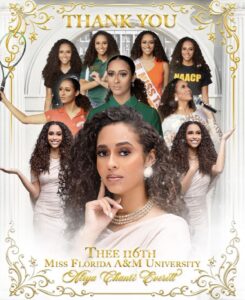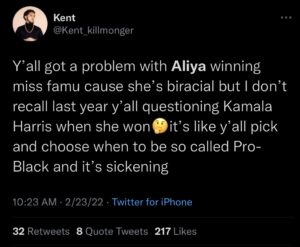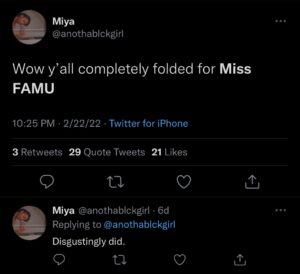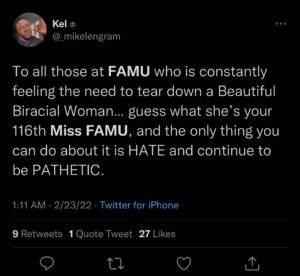
Historically Black colleges and universities have been coined institutions of higher education that are geared toward the Black community. Many students take pride in being able to be around those who look like them before transitioning into the real world.
Although HBCUs provide an incomparable sense of community and culture, they are still environments subject to discrimination and negativity.
Florida A&M University is known for its elaborate campaign seasons with students running for esteemed positions like Mister and Miss FAMU, King & Queen of Orange and Green, class attendants, or president and vice president. Elections propel students into the limelight through social media which leads to extreme judgment from their peers.
Students at FAMU went to Twitter with their discontent after the Student Government Association’s Electoral Commission announced last week that Aliya Everett, a third-year broadcast journalism major from Blountstown, as the 116th Miss FAMU-elect.
Because Everett has a lighter complexion, some labeled her “a white woman” and expressed their disdain for her being the face at an HBCU.

Other students took issue with the hatred and negativity directed at Everett, who is biracial. A FAMU student wrote in a tweet, “Yall got a problem with Aliya winning miss famu cause she’s biracial but I don’t recall last year y’all questioning Kamala Harris when she won; it’s like yall pick and choose when to be Pro-Black and it’s sickening.”
When asked about the vitriol, Everett said it hurt that her hard work and accomplishments are being overlooked by her race. “I come from a small town where a lot of people don’t make it out,” Everett said. “I came to FAMU to show the youth from back home that I can do big things … and to make my family proud, because I am a first generation [student].”

Many have called the negative comments Everett has received colorism, which isn’t the case by definition. Colorism is defined as discrimination of those with a darker skin tone and a preference for lighter skin. Although this isn’t an example of colorism on an HBCU campus, it does showcase the intense judgment that students face at FAMU based on their skin color.
Skin color discrimination has roots dating all the way back to slavery where darker skin slaves were subject to field work and lighter skin slaves were allowed to work inside the house in close proximity to white people. This discrimination continued through systemic rules like “paper bag tests” during the Jim Crow era.
Through years of conditioning, Black people and other minority groups have adopted values that create further separation within their racial groups. Maddox and Gray of Tufts University conclude through research, “… skin tone has been seen as important only in its role in determining racial category membership. This perspective eclipses the possibility that variation in skin tone may play a role as a sub dimension within a racial category.”
Biracial students on an HBCU campus can be seen as not Black enough in the Black community and not white enough in the white community. That dissonance between where to fit in is a social dilemma that is challenging to navigate.

In a study conducted by a graduate student at the University of Georgia, the author wrote, “While all racial identities are socially constructed, this is likely particularly salient to biracial individuals because of their unique position in the racial hierarchy.”
Biracial students have the ability to conduct themselves according to multiple different racial identities which can affect the ways that others view them. This intersectionality between race, sex, and gender all plays a part in influencing people’s experiences and the way they interact with others.
Students at FAMU come to the No. 1 public HBCU to experience the unique community and culture, not to experience hatred and discrimination from their peers. Why in the world was Everett treated the way she was?